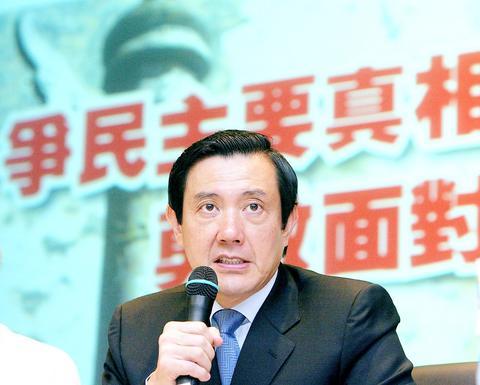On the Tiananmen massacre's 15th anniversary, Taipei Mayor Ma Ying-jeou (
Ma spoke at a forum held by the New Taiwanese Cultural Foundation and the United Daily News to commemorate the June 4, 1989, suppression of Chinese demonstrators in Beijing.

PHOTO: CNA
Ma noted that "China's Ministry of Foreign Affairs has redefined the Tiananmen movement as `the political disturbance that occurred at the turn of spring and summer in 1989' instead of `a counter-revolutionary rebellion,'" Ma said. "However, the Beijing authorities simply gave up stigmatizing the movement in order to dilute the fact of carnage."
"In fact, Beijing neither faced up to the historical truth nor did they examine their responsibility in a real sense," Ma added.
Ma cited an article he published in yesterday's United Daily News in which he accused the Democratic Progressive Party (DPP) of manipulating populism in order to gain power.
Ma said democracy in China is like baby who died in infancy, while in Hong Kong democracy is like a child whose growth has been stunted. Relative to these cases, he said, democracy developed more healthily in Taiwan.
"However, the controversies over the presidential election in Taiwan have impacted on Chinese intellectuals, who have great expectations for democracy," Ma said.
He said that although Taiwan has regular elections and its press freedom is more advanced than in China, the presidential election caused confrontation and hatred between people and hurt administrative neutrality.
"I am disappointed but I will never despair, because I have confidence in the democratic and judiciary systems and believe that Taiwan has the ability to reflect" on its historical experience, Ma said.
Ma also urged China's people to join in efforts to facilitate cross-strait dialogue and to work for peace and democracy.
Ma said the fact that Beijing vetoed the people of Hong Kong's desire to vote for their chief executive has made Taiwanese who have opposed the "one China, two systems" policy more disillusioned and disappointed by China.
Ma called on China not to employ military force against Taiwan since wars only stir up the most negative side of people and cause unhealing wounds.
"Although the DPP is a variable that destabilizes cross-strait security, it is also a partner who vies with us to develop democracy," Ma said. He said that continued debate with the ruling party will help Taiwan's democratic development, especially in the area of constitutional amendments.
Ma said that although China is trying to erase the memory of the Tiananmen massacre, the truth will be known one day.
"China's recent policy of `peaceful rising' might not be necessarily respectable and desirable," Ma said.

Nipah virus infection is to be officially listed as a category 5 notifiable infectious disease in Taiwan in March, while clinical treatment guidelines are being formulated, the Centers for Disease Control (CDC) said yesterday. With Nipah infections being reported in other countries and considering its relatively high fatality rate, the centers on Jan. 16 announced that it would be listed as a notifiable infectious disease to bolster the nation’s systematic early warning system and increase public awareness, the CDC said. Bangladesh reported four fatal cases last year in separate districts, with three linked to raw date palm sap consumption, CDC Epidemic Intelligence

Two Taiwanese prosecutors were questioned by Chinese security personnel at their hotel during a trip to China’s Henan Province this month, the Mainland Affairs Council (MAC) said yesterday. The officers had personal information on the prosecutors, including “when they were assigned to their posts, their work locations and job titles,” MAC Deputy Minister and spokesman Liang Wen-chieh (梁文傑) said. On top of asking about their agencies and positions, the officers also questioned the prosecutors about the Cross-Strait Joint Crime-Fighting and Judicial Mutual Assistance Agreement, a pact that serves as the framework for Taiwan-China cooperation on combating crime and providing judicial assistance, Liang

The manufacture of the remaining 28 M1A2T Abrams tanks Taiwan purchased from the US has recently been completed, and they are expected to be delivered within the next one to two months, a source said yesterday. The Ministry of National Defense is arranging cargo ships to transport the tanks to Taiwan as soon as possible, said the source, who is familiar with the matter. The estimated arrival time ranges from late this month to early next month, the source said. The 28 Abrams tanks make up the third and final batch of a total of 108 tanks, valued at about NT$40.5 billion

Reports of Taiwanese going missing, being detained or interrogated, or having their personal liberties restricted in China increased about fourfold annually last year, the Mainland Affairs Council (MAC) said yesterday. Last year, 221 Taiwanese who traveled to China were reported missing, were detained and interrogated, or otherwise had their personal freedom restricted, up from 55 the previous year, the council said. Reopening group tours to China would be risky, as it would leave travelers with no way to seek help through official channels after Beijing shut down dialogue between the associations tasked with handling cross-strait tourism, the MAC said. Taipei’s Taiwan Strait Tourism